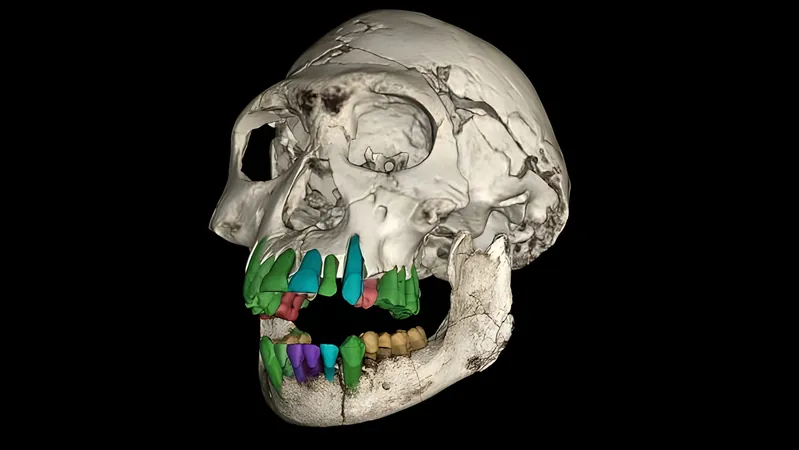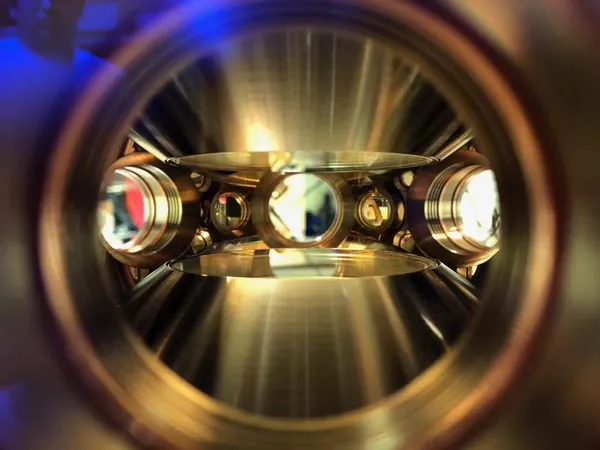
The Surprising Secrets of Our Ancestors: How Fossil Teeth Unravel the Mystery of Large Human Brains
2024-11-16
Author: Jia
The evolution of humans and their remarkably large brains has puzzled scientists for years, but recent findings from fossilized teeth may shed light on this enigmatic topic.
Researchers have turned their attention to a fossilized tooth from an early Homo species discovered in Georgia, dating back approximately 1.77 million years. Thanks to advanced imaging technology at the European Synchrotron in Grenoble, France, these findings could transform our understanding of human development.
Extended Childhood: The Key to Bigger Brains?
Traditionally, it was believed that the extended childhood seen in modern humans directly contributed to the growth of our larger brains. However, a groundbreaking study led by a team of researchers from Switzerland's University of Zurich, the European Synchrotron Radiation Facility, and Georgia's National Museum suggests the opposite may be true.
By analyzing the dental development of a nearly adult fossil, the researchers found that these early humans may have had an extended childhood similar to modern humans, despite having brains only slightly larger than a chimpanzee's. This raises intriguing questions about the actual relationship between brain size and the duration of childhood.
What if the delayed maturation process allowed early Homo species to rely more on cultural transmission of knowledge? If these early humans had a longer period of dependency on adults, they could have absorbed considerable knowledge over generations, ultimately leading to the evolution of larger brains and longer life spans.
Revolutionary Insights from Teeth
In their study, the researchers leveraged synchrotron imaging to gain insights into the dental growth of the early Homo specimen from the Dmanisi site. Christoph Zollikofer, the first author of the study, explained that teeth are vital in this research: “Childhood and cognition do not fossilize, so we have to rely on indirect information. Teeth are ideal because they fossilize well and produce daily rings, similar to trees.”
Paul Tafforeau, the co-author, added, “Dental development is strongly correlated with the development of the rest of the body, including brain development.” This correlation means that studying teeth can offer clues about the overall growth and development of early humans.
After two decades of research, the team was astonished by their findings. They discovered that dental growth in early Homo was markedly different from what they anticipated, showing an accelerated molar crown growth compared to other known hominids, implying a unique developmental pathway.
Long Childhood as Evolution's Strategy
The results indicated that early Homo children likely experienced a prolonged use of milk teeth, suggesting they needed adult supervision for longer than great apes. This theory posits that early Homo may represent a pivotal evolutionary experiment in the development of a lengthy childhood.
Interestingly, evidence suggests that some early humans lived well into old age, indicating they received care from their groups. This social structure might have supported a cultural transmission model, where knowledge and skills passed from elder to younger group members, proving beneficial for group survival and resource utilization.
The Bigger Picture
The accumulation of such knowledge could have selected for larger brains, fostering complex behaviors and longer childhoods, ultimately reshaping the human experience.
This transition would allow for delayed adulthood, thus creating a species capable of thriving in complex environments.
These findings challenge the long-held belief connecting larger brains directly to prolonged childhood, suggesting instead that it might have been the extended childhood that facilitated the rise of larger brains in humans—an example of bio-cultural evolution.
Published in the prestigious journal Nature, this groundbreaking research opens the door for future studies that could reshape our understanding of human evolution.
Scientists are now encouraged to explore these newfound insights as we delve deeper into what makes us uniquely human.
Stay tuned for more fascinating discoveries that reveal the secrets of our evolutionary past!




 Brasil (PT)
Brasil (PT)
 Canada (EN)
Canada (EN)
 Chile (ES)
Chile (ES)
 España (ES)
España (ES)
 France (FR)
France (FR)
 Hong Kong (EN)
Hong Kong (EN)
 Italia (IT)
Italia (IT)
 日本 (JA)
日本 (JA)
 Magyarország (HU)
Magyarország (HU)
 Norge (NO)
Norge (NO)
 Polska (PL)
Polska (PL)
 Schweiz (DE)
Schweiz (DE)
 Singapore (EN)
Singapore (EN)
 Sverige (SV)
Sverige (SV)
 Suomi (FI)
Suomi (FI)
 Türkiye (TR)
Türkiye (TR)